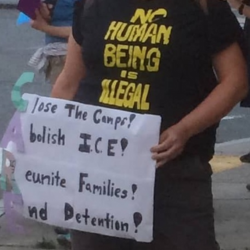
Images of small children in cages, crying for their parents, have flooded my email and social media. I’m saddened and enraged as a human being, and as a US citizen I’m appalled by what the government is doing in all of our names. As the granddaughter of Ethel and Julius Rosenberg, and the daughter of their younger son, Robert Meeropol, I also have a unique and deeply personal reaction to seeing children separated from parents. The circumstances are very different, but at the core the similarities resonate: once again, our government is using children as weapons in the battle for public opinion in a time of mass hysteria around a perceived national threat.
When I saw the pictures of so many children in detention, it reminded me of one of the images that keeps me up at night when I think about my dad’s childhood: my father as a little boy, trying to understand why his parents disappeared from his life after they were arrested; and of the time he and his older brother spent in a shelter when their extended family was unable or unwilling to care for them.
My dad wrote about that experience in his memoir, An Execution in the Family: “We were placed in a shelter in the Bronx. I didn't understand why we were there, but I knew something was profoundly wrong… I remember being very unhappy in the shelter. I recall it as loveless. I also remember thinking that my parents were in prison and that the shelter was my prison” (page 10).
As difficult as his time in the shelter and his parents’ imprisonment and eventual execution was for my dad, at least he could eventually visit his parents, and get letters from them before their deaths. He also had his deeply supportive and protective older brother with him; and the boys had a lawyer and eventually a huge support network of caring adults advocating for them. My dad and his brother also spoke the same language as those who were in charge of them and thus could communicate, to the extent children of that age can do, and try to understand what was happening and why.
But even with all those beneficial factors, my dad still equated his time in the shelter as imprisonment and more than 65 years later, his older brother refers to that period of their life as “the long nightmare.” And today children in immigration detention have none of those supports.
I find it extraordinary that my dad and uncle grew up to be loving, functional adults and parents and grandparents. That is an enormous credit to their own resilience, the love and support they experienced in the homes of their birth parents and their eventual adoptive parents, and the tens of thousands of people who, at the height of the McCarthy era, risked their own jobs and freedom to protest the executions and fight for my dad and uncle.
My father founded the Rosenberg Fund for Children (the organization I now run) in part as his way of thanking those people and passing on their courage and compassion by helping children in the U.S. today whose parents face harassment, imprisonment or worse because of their progressive activism. Far too many of the children we support experience separation from one or more of their parents, often resulting in life-long trauma.
I think many people feel paralyzed by the enormity of the situation and wonder whether donating a little money to groups on the ground or making calls or attending demonstrations matters. I know from my work and from my own family experience that seeing hundreds, or thousands, or millions of people acknowledge your pain and act to stop it makes a huge difference. It not only can and does change policies, it also lets those suffering the most immediate impact of these heartless policies know that they are not invisible.
Holding children hostage in terrifying and harmful situations in order to punish parents or to try to win political battles is not new. It’s a shameful part of our country’s history. But resisting these injustices is also part of our heritage. The people who fought for my family were my dad’s heroes and they are mine as well. I hope we learn from this history and remember what we can accomplish when we stand up for immigrant children and families and insist on their human rights. I’m grateful every day that my work allows me to advocate for children who are used as pawns for political gain. I’ll continue doing so for the crying children in cages, for the little boys who were my dad and uncle, and in honor of all those who stood with them then and now.
[My dad shares his thoughts on this issue in an essay you can read here. Read Former RFC Board Chair Rafael Rodriguez Cruz's article on The Rosenberg Case and the current family separations here (note: this article is in Spanish).]

Comments
families
Our only future lies in treating all humans with love.